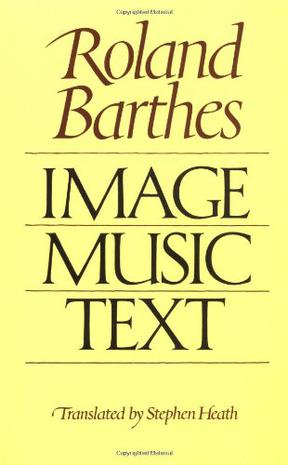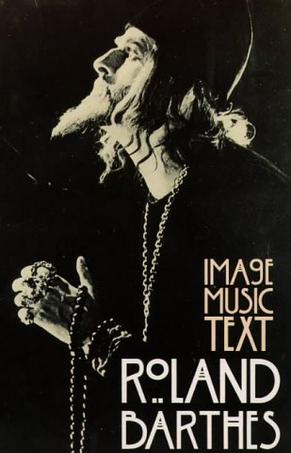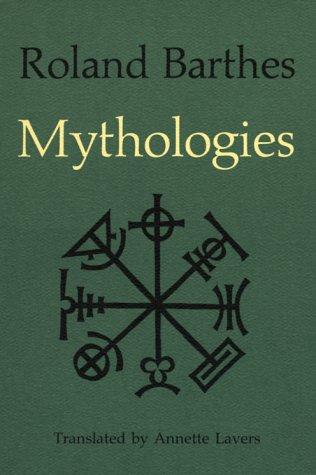-

Image-Music-Text
These essays, as selected and translated by Stephen Heath, are among the finest writings Barthes ever published on film and photography, and on the phenomena of sound and image. The classic pieces "Introduction to the Structural Analysis of Narrative" and "The Death of the Author" are also included. -

Image Music Text
These essays, as selected and translated by Stephen Heath, are among the finest writings Barthes ever published on film and photography, and on the phenomena of sound and image. The classic pieces "Introduction to the Structural Analysis of Narrative" and "The Death of the Author" are also included. -

Elements of Semiology
"In his Course in General Linguistics, first published in 1916, Saussure postulated the existence of a general science of signs, or Semiology, of which linguistics would form only one part. Semiology, therefore aims to take in any system of signs, whatever their substance and limits; images, gestures, musical sounds, objects, and the complex associations of all these, which form the content of ritual, convention or public entertainment: these constitute, if not languages, at least systems of signification . . . The Elements here presented have as their sole aim the extraction from linguistics of analytical concepts which we think a priori to be sufficiently general to start semiological research on its way. In assembling them, it is not presupposed that they will remain intact during the course of research; nor that semiology will always be forced to follow the linguistic model closely. We are merely suggesting and elucidating a terminology in the hope that it may enable an initial (albeit provisional) order to be introduced into the heterogeneous mass of significant facts. In fact what we purport to do is furnish a principle of classification of the questions. These elements of semiology will therefore be grouped under four main headings borrowed from structural linguistics: I. Language and Speech; II. Signified and Signifier; III. Syntagm and System; IV. Denotation and Connotation."--Roland Barthes, from his Introduction -

Empire of Signs
With this book, Barthes offers a broad-ranging meditation on the culture, society, art, literature, language, and iconography--in short, both the sign-oriented realities and fantasies--of Japan itself. Roland Barthes was born in 1915 and studied French literature and the classics at the University of Paris. After teaching French at universities in Romania and Egypt, he joined the Centre National de Recherche Scientifique, where he devoted himself to research in sociology and lexicology. He was a professor at the College de France until his death in 1980. With this book, Barthes offers a broad-ranging meditation on the culture, society, art, literature, language, and iconography--in short, both the sign-oriented realities and fantasies--of Japan itself. "If Japan did not exist, Barthes would have had to invent it--not that Japan "does" exist in "Empire of Signs," for Barthes is careful to point out that he is not analyzing the real Japan, there is no terrible "innerness" as in the West, no soul, no God, no fate, no ego, no grandeur, no metaphysics, no 'promotional fever, ' and finally no meaning . . . For Barthes Japan is a test, a challenge to think the unthinkable, a place where meaning is finally banished. Paradise, indeed, for the great student of signs."--Edmund White, "The New York Times Book Review" -

A Lover's Discourse
The language we use when we are in love is not a language we speak, for it is addressed to ourselves and to our imaginary beloved. It is a language of solitude, of mythology, of what Barthes calls an 'image repertoire'. This book revives beyond the psychological or clinical enterprises which have characterised such researches in our culture - the notion of the amorous subject. It will be enjoyed and understood by two groups of readers: those who have been in love (Or think they have, which is the same thing), and those who have never been in love (or think they have not, which is the same thing). This book might be considered, in its restless search for authorities and examples, which range from Nietzsche to Zen, from Ruysbroek to Debussy, an encyclopaedia of that affirmative discourse which is the lover's. -

Mythologies
"[Mythologies] illustrates the beautiful generosity of Barthes's progressive interest in the meaning (his word is signification) of practically everything around him, not only the books and paintings of high art, but also the slogans, trivia, toys, food, and popular rituals (cruises, striptease, eating, wrestling matches) of contemporary life . . . For Barthes, words and objects have in common the organized capacity to say something; at the same time, since they are signs, words and objects have the bad faith always to appear natural to their consumer, as if what they say is eternal, true, necessary, instead of arbitrary, made, contingent. Mythologies finds Barthes revealing the fashioned systems of ideas that make it possible, for example, for 'Einstein's brain' to stand for, be the myth of, 'a genius so lacking in magic that one speaks about his thought as a functional labor analogous to the mechanical making of sausages.' Each of the little essays in this book wrenches a definition out of a common but constructed object, making the object speak its hidden, but ever-so-present, reservoir of manufactured sense."--Edward W. Said This text refers to the Paperback edition.